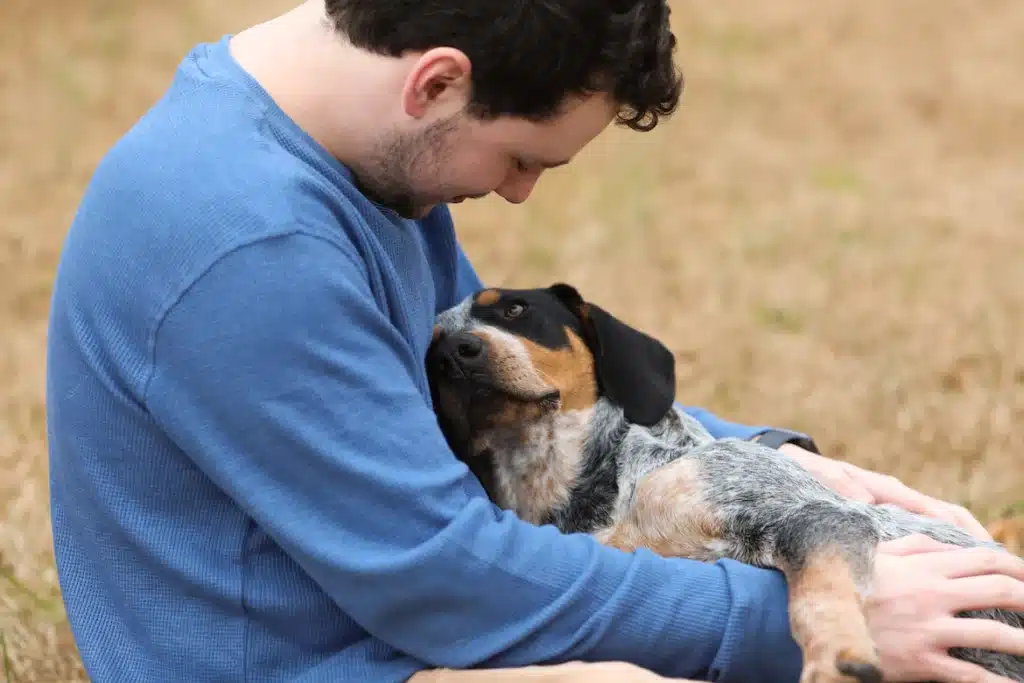As a dog lover, you probably already know that dogs are more than just pets. They are our faithful friends, our loyal protectors, and our empathetic companions. But what exactly does empathy mean in dogs, and how do they express and perceive emotions? In this blog post, we’ll explore the fascinating world of empathy in dogs, based on real scientific sources.
What is Empathy and Why Does it Matter?
Understanding and sharing the feelings of others, and responding to their needs and emotions is known as empathy. This social skill is vital for humans to connect, communicate, cooperate, help, and form relationships. Empathy is also linked to morality, as it allows us to feel compassion, guilt, and shame, and to act ethically and selflessly.
Not just humans, but also many animals display empathy, such as primates, elephants, dolphins, and dogs. Animals’ empathy is evaluated based on their ability to recognize and respond to emotional cues from others, such as facial expressions, vocalizations, or body language. The animals’ empathy also depends on their social and cognitive skills, such as the theory of mind, and mirror neurons.
How Do Dogs Show Empathy?
Dogs are highly sociable animals that have a strong bond with humans. They are capable of responding to human emotions, such as happiness, sadness, fear, anger, and stress. Through their senses of sight, sound, smell, and touch, dogs can perceive and interpret a wide range of emotional cues from their human companions. Dogs can also adjust their behavior and vocalizations to match their owners’ emotional state, by wagging their tails, licking their faces, leaning against them, or barking in different tones.
Furthermore, dogs can display empathy towards other dogs or animals, especially if they have a relationship with them. They can use various forms of communication, including body language, facial expressions, and vocalizations, to express and understand emotions. Additionally, dogs can use their sense of smell to detect changes in the chemical signals of other animals, such as pheromones or cortisol levels, which may indicate stress or fear.
Empathy is a complex cognitive and emotional process that involves the ability to identify, understand, and respond to the emotions of others. While there is some debate about whether animals can truly experience empathy, there is growing evidence that dogs possess some level of empathy.
Can Dogs Understand Human Expressions?
One way that dogs may demonstrate empathy is through their ability to read and respond to human body language. Studies have shown that dogs are highly skilled at interpreting human gestures and facial expressions and that they use this information to understand our emotions and respond appropriately.
For example, a 2016 study published in the journal PLOS ONE found that dogs were able to distinguish between happy and angry human facial expressions and that they were more likely to approach a person with a happy expression. This suggests that dogs may be able to recognize and respond to our emotional states.
Do Dogs Know When Humans Are Stressed and Distressed?
Another way that dogs may demonstrate empathy is through their response to the stress and distress of their human companions. Studies have shown that dogs can detect changes in our physiological responses to stress, such as changes in heart rate and breathing, and that they may respond by offering comfort or seeking out physical contact.
For example, a 2018 study published in the International Journal of Environmental Research and Public Health found that dogs were able to reduce the stress levels of children with autism spectrum disorder by offering physical contact and social support. This suggests that dogs may be able to sense when we are in distress and respond in a way that is comforting and supportive.
Why Does Empathy Matter for Dogs and Humans?
Empathy matters for dogs and humans for many reasons. For dogs, empathy is a crucial aspect of their social and emotional well-being, as it allows them to form and maintain positive relationships with humans and other dogs. Empathy also helps dogs to adapt to new situations, cope with stress and anxiety, and learn from their experiences.
For humans, empathy with dogs can enhance our understanding and appreciation of their needs and emotions and can strengthen our bond with them. Empathy with dogs can also promote positive attitudes and behaviors towards animals, such as kindness, compassion, and responsibility, and can contribute to our overall well-being, by reducing stress, loneliness, and depression.
Moreover, empathy with dogs can inspire us to treat other humans with empathy and respect and extend our moral circle beyond our own species. Empathy with dogs can remind us of the interconnectedness of all living beings, and of our responsibility to protect and care for the natural world.

Can Dogs Feel Guilt and Shame?
Understanding Guilt and Shame in Humans
Guilt and shame are complex emotions that are often associated with humans. They are usually triggered when a person feels they have done something wrong or have violated social norms. Guilt and shame involve self-awareness of one’s own actions and their consequences, as well as a concern for the opinions and expectations of others. These aspects of guilt and shame rely on a sophisticated level of thinking called mentalizing, which involves the ability to understand and interpret the mental states of oneself and others.
The Complexity of Guilt and Shame in Dogs
While dogs are capable of feeling emotions and empathizing with their human companions, there is still a debate about whether or not dogs can truly feel guilt and shame in the same way that humans do. This is because dogs have cognitive limitations, which can make it difficult for them to understand complex emotions. They also lack the same moral understanding as humans, as guilt and shame are often associated with violations of social norms and moral standards.
Behaviors Associated with Guilt and Shame in Dogs
Dogs may exhibit behaviors that seem related to guilt or shame, like avoiding eye contact, lowering their head or tail, or cowering. Nonetheless, these behaviors are known as appeasement behaviors, and they suggest fear, anxiety, or an effort to comply with their owner’s perceived power rather than genuine guilt or shame.
The Importance of Recognizing Dogs’ Emotional Capabilities
While dogs are not capable of feeling guilt or shame in the same way that humans do, it is important to recognize and respect their emotional capabilities and limitations. Dogs are emotional beings that can feel a range of basic emotions, such as happiness, fear, anger, and love. Dogs are also capable of feeling empathy, which is a crucial aspect of their social and emotional well-being, as it allows them to form and maintain positive relationships with humans and other dogs.
By recognizing and nurturing dogs’ emotional capabilities, we can enhance our relationship with them and with each other, and contribute to a more empathetic and ethical society. It is important to provide dogs with appropriate training, socialization, and care that are based on positive reinforcement and mutual trust, rather than punishment or humiliation. This can help dogs to develop their emotional intelligence and resilience and to live happy and healthy lives.
If you are interested in learning more about canine behavior, check out these articles:
- Dog Punishment: The Best Technique
- How Dogs Learn
- Does Enrichment Affect Dog Longevity?
- Understanding Canine Behavior: Insights and Solutions
- The Essential Guide to a Problem-Free Dog

Bibliographic sources :
- Adriaense, J. E., Koski, S. E., Huber, L., & Lamm, C. (2020). “Challenges in the comparative study of empathy and related phenomena in animals”, Neuroscience & Biobehavioral Reviews, Volume 112, May 2020, Pages 62-82.
- Huber A, Barber ALA, Faragó T, Müller CA, Huber L. Investigating emotional contagion in dogs (Canis familiaris) to emotional sounds of humans and conspecifics. Anim Cogn. 2017 Jul;20(4):703-715. doi: 10.1007/s10071-017-1092-8. Epub 2017 Apr 21. PMID: 28432495; PMCID: PMC5486498.
- Barber ALA, Randi D, Müller CA, Huber L (2016) The Processing of Human Emotional Faces by Pet and Lab Dogs: Evidence for Lateralization and Experience Effects. PLoS ONE 11(4): e0152393. https://doi.org/10.1371/journal.pone.0152393
- Andrews, Kristin and Susana Monsó, “Animal Cognition”, The Stanford Encyclopedia of Philosophy (Spring 2021 Edition), Edward N. Zalta (ed.)
- Bekoff, M. (2007). The emotional lives of animals: A leading scientist explores animal joy, sorrow, and empathy – and why they matter. New World Library.
- Horowitz, A. (2009). Inside of a dog: What dogs see, smell, and know. Simon and Schuster.
- Kujala, M. V., Kujala, J., Carlson, S., & Hari, R. (2012). Dog experts’ brains distinguish socially relevant body postures similarly in dogs and humans. PLoS One, 7(6), e39145. doi: 10.1371/journal.pone.0039145
- Custance D, Mayer J. Empathic-like responding by domestic dogs (Canis familiaris) to distress in humans: an exploratory study. Anim Cogn. 2012 Sep;15(5):851-9. doi: 10.1007/s10071-012-0510-1. Epub 2012 May 29. PMID: 22644113.
* This article was written with the help of an AI language model, specifically ChatGPT. Although the template generated the initial content, it was extensively reviewed, edited, and checked by the author to ensure accuracy and compliance with Google guidelines. The author takes full responsibility for the final product and for any errors or inaccuracies that may remain. *






